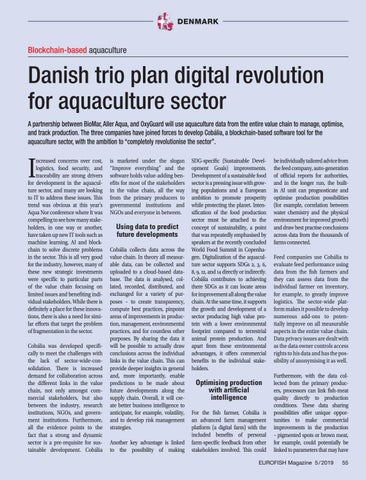DENMARK
Blockchain-based aquaculture
Danish trio plan digital revolution for aquaculture sector A partnership between BioMar, Aller Aqua, and OxyGuard will use aquaculture data from the entire value chain to manage, optimise, and track production. The three companies have joined forces to develop CobĂĄlia, a blockchain-based software tool for the aquaculture sector, with the ambition to “completely revolutionise the sectorâ€?.
I
ncreased concerns over cost, logistics, food security, and traceability are strong drivers for development in the aquaculture sector, and many are looking to IT to address these issues. This trend was obvious at this year’s Aqua Nor conference where It was compelling to see how many stakeholders, in one way or another, have taken up new IT tools such as machine learning, AI and blockchain to solve discrete problems in the sector. This is all very good for the industry, however, many of these new strategic investments were specific to particular parts of the value chain focusing on limited issues and benefiting individual stakeholders. While there is definitely a place for these innovations, there is also a need for similar efforts that target the problem of fragmentation in the sector. Cobålia was developed specifically to meet the challenges with the lack of sector-wide-consolidation. There is increased demand for collaboration across the different links in the value chain, not only amongst commercial stakeholders, but also between the industry, research institutions, NGOs, and government institutions. Furthermore, all the evidence points to the fact that a strong and dynamic sector is a pre-requisite for sustainable development. Cobålia
is marketed under the slogan “Improve everything� and the software holds value-adding benefits for most of the stakeholders in the value chain, all the way from the primary producers to governmental institutions and NGOs and everyone in between.
Using data to predict future developments Cobålia collects data across the value chain. In theory all measurable data, can be collected and uploaded to a cloud-based database. The data is analysed, collated, recorded, distributed, and exchanged for a variety of purposes – to create transparency, compute best practices, pinpoint areas of improvements in production, management, environmental practices, and for countless other purposes. By sharing the data it will be possible to actually draw conclusions across the individual links in the value chain. This can provide deeper insights in general and, more importantly, enable predictions to be made about future developments along the supply chain. Overall, it will create better business intelligence to anticipate, for example, volatility, and to develop risk management strategies. Another key advantage is linked to the possibility of making
SDG-specific (Sustainable Development Goals) improvements. Development of a sustainable food sector is a pressing issue with growing populations and a European ambition to promote prosperity while protecting the planet. Intensification of the food production sector must be attached to the concept of sustainability, a point that was repeatedly emphasised by speakers at the recently concluded World Food Summit in Copenhagen. Digitalization of the aquaculture sector supports SDGs 2, 3, 6, 8, 9, 12, and 14 directly or indirectly. CobĂĄlia contributes to achieving there SDGs as it can locate areas for improvement all along the value chain. At the same time, it supports the growth and development of a sector producing high value protein with a lower environmental footprint compared to terrestrial animal protein production. And apart from these environmental advantages, it offers commercial benefits to the individual stakeholders.
Optimising production with artiďŹ cial intelligence For the fish farmer, CobĂĄlia is an advanced farm management platform (a digital farm) with the included benefits of personal farm-specific feedback from other stakeholders involved. This could
be individually tailored advice from the feed company, auto-generation of official reports for authorities, and in the longer run, the builtin AI unit can prognosticate and optimise production possibilities (for esample, correlation between water chemistry and the physical environment for improved growth) and draw best practise conclusions across data from the thousands of farms connected. Feed companies use Cobålia to evaluate feed performance using data from the fish farmers and they can assess data from the individual farmer on inventory, for example, to greatly improve logistics. The sector-wide platform makes it possible to develop numerous add-ons to potentially improve on all measurable aspects in the entire value chain. Data privacy issues are dealt with as the data owner controls access rights to his data and has the possibility of anonymising it as well. Furthermore, with the data collected from the primary producers, processors can link fish-meat quality directly to production conditions. These data sharing possibilities offer unique opportunities to make commercial improvements in the production – pigmented spots or brown meat, for example, could potentially be linked to parameters that may have
EUROFISH Magazine 5 / 2019
& +-((
55
